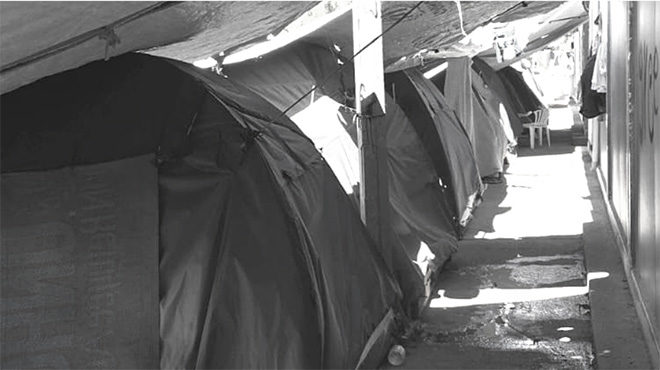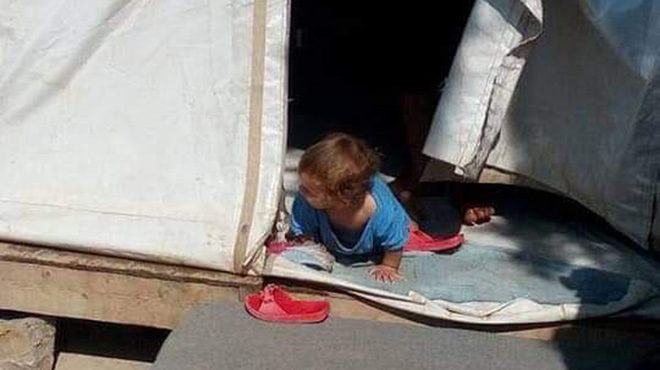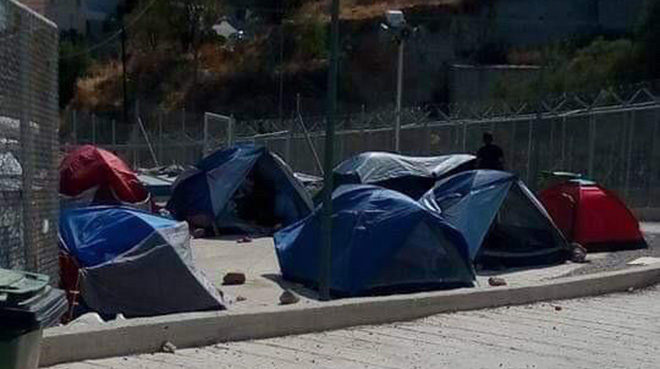News
Situation on Samos has reached the edge

The situation on Samos island has reached the edge as the grim conditions under which hundreds of refugees live in Vathi hotspot are a humanitarian disaster. Meanwhile, reactions by local society including xenophobic voices are strengthened. PRO ASYL / RSA have repeatedly highlighted concerns over the toxic impact of the EU-Turkey deal.
As of 14 February, Vathi hotspot was seriously overcrowded and hosted 3,743 persons while its capacity is for 650 and despite government promises for improvements, the situation appears to get worse. Of particular concern is the situation of unaccompanied children who reside in the hotspot. According to the UN Refugee Agency, in December 2018 unaccompanied children in Vathi hotspot were forced to take turns to sleep due to lack of mattresses. In the informal camp next to the hotspot, tens of refugees including families with small children are forced to live in tents and are exposed to the adverse weather conditions.
According to reports, there is no doctor in the hotspot from the Greek Centre for Disease Control and Prevention (H.C.D.C.P) since the last and only one resigned earlier this February. As a result, it has fallen upon the understaffed Samos hospital to provide essential healthcare to the thousands of refugees living in the hotspot and the island. The lack of medical staff in the hotspot impacts not only the healthcare of refugees but also the vulnerability assessment procedure. This leads to delays of transfers of those vulnerable to the mainland.
It is worth noting that Greece has been requested by the EU to take steps so that Samos structures can host 1,500 by September 2019. In the beginning of December 2018, Vivi Michou, the General Director of Migration Policy and Internal Affairs in the European Commission, stated that the situation in Samos hotspot is worse than that of Moria on Lesvos.
In addition, Dimitris Vitsas, Minister for Migration Policy, admitted early this month that the situation on Samos has exceeded the limits and stated that a second asylum unit will be send to the island to accelerate the asylum procedure and 250 unaccompanied children would be transferred to the mainland.

According to UNHCR, in recent weeks transfers from the islands of the Aegean to the mainland have dropped. For example, between 4 and 10 February only 265 transfers have taken place in comparison to the period of 7 to 13 January when a total of 735 persons had been transferred to the mainland. At the same time, during 4 and 10 February, Samos had 105 refugee arrivals and Lesvos, 213. It is obvious that transfers are not enough as arrivals equal the departures to the mainland.
Refugees protesting over living conditions
At the end of January, hundreds of refugees protested on Samos once more for the dire living conditions and asked for their transfer to the mainland and multiple articles in national and international media described the desperate situation.
»In the food queues, there is a lot of tension. I ask money from my relatives so that I can buy some food«
Alan* a refugee from Syria who spend the first four months after his arrival in 2018 on the island in a tent; he now lives in a container. He told us: “When I arrived on Samos and the authorities transferred me to the hotspot, I had to buy a tent and set it up where there was an empty space. The biggest problem for refugees is that a large number lives in tents and the food we are given is of really bad quality. In the food queues, there is a lot of tension. I ask money from my relatives so that I can buy some food”. As far as legal support for his asylum application, Alan told us that legal aid is limited and as a result he was forced to seek the services of a private lawyer. Meanwhile, the date for the examination of his asylum claim has been scheduled for 2020 and he does not know whether he can survive under the conditions he is forced to live. At the same time, he feels undesired on the island.
Fuelled xenophobia
On 7 February, a general strike took place that had as a focus the refugee issue on the island. Those participating ranged from groups who in the past had a neutral position on the refugee issue such as workers’ trade unions. On the other hand, other groups participating in the strike had in the past expressed xenophobic rhetoric and had expressly stated that their opposition to the presence of refugees and migrants on the island. The persistent non-fulfilment of political promises by the Ministry of Migration Policy regarding the improvement of reception conditions and transfers of vulnerable refugees to the mainland has led to the creation of a political front against the presence of the hotspot on the island.

Those participating in the current strike asked amongst others for closure of Vathi hotspot, for the government to stop the plans for the establishment of a new hotspot, for the transfer of refugees to the mainland and the end of the EU-Turkey deal. But reportedly the main message from this strike was to remove refugees from the island in order to avoid more consequences upon the local society and economy.
An island with no structures
The situation on the island is explosive and refugees experience daily hostility by parts of the local population. Giasemo Kehagia is an activist from the Movement for Human Rights – Solidarity on Samos and spoke to Refugee Support Aegean about the situation in Vathi where the hotspot is situated. “The town does not have basic public facilities such as public toilets and showers; There are no places for sports receiving the refugees or any other entertainment places; Shop owners many times demand they leave their shops, mainly cafes and restaurants…Africans in particular experience more racism….”.
Even teachers did not escape xenophobic attacks
Another serious cause of concern is related to the tensions regarding the education of refugee children. At the end of January, teachers expressing their support to refugee children attending Samos schools were attacked by parents during a meeting of Parents’ Associations on the island. This is another incident that follows previous xenophobic attacks to refugees, solidarity citizens and NGO staff.